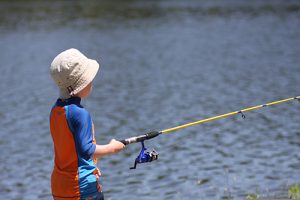Are PFAS on My Plate? Assessing Maine Anglers’ Preferences for Fish Consumption
 By Kyle Willis
By Kyle Willis
What types of freshwater fish do Maine fishers prefer on their plates? It can seem like a trivial question at first, but it has potentially large consequences for Maine fisheries, tourism, and public health. This is why Dr. Caroline Noblet, an Associate Professor in UMaine’s School of Economics and Faculty Fellow in the Mitchell Center, is leading a project seeking answers to this question. With support from the Maine Department of Inland Fisheries and Wildlife (DIF&W), Dr. Noblet along with her colleague Dr. Dianne Kopec, Mitchell Center Faculty Fellow and Molly Shea, graduate student, have begun to conduct research into the fish consumption and harvesting habits of people who fish in Maine.
The DIF&W has supported this research due to its significant implications for public health; it supports the safety of people who eat these fish, and it enhances the knowledge of public officials who need to make health advisories about this food source. Recreational fishing is the main source of wild freshwater fish consumption throughout Maine; changes to the health of Maine’s waters and the fish in them are important to communicate to the public. The research team wants to know why Maine fishers catch and eat – or catch and release – certain freshwater fish. Among other questions, the team will ask if fishers choose to catch and release based on environmental beliefs or based on the perceived safety of consuming Maine fish.
Beginning in Spring 2024, the team is planning to survey people with Maine fishing licenses, both residents and nonresidents, about their fish harvest and consumption habits. The survey will also collect data on their knowledge and perception of environmental concerns in Maine waters, including the presence of harmful contaminants like mercury or PFAS, perfluoroalkyl and polyfluoroalkyl substances often called “forever chemicals.” Information will be collected throughout different seasons, as habits may vary between ice fishers and summer anglers. The team is currently co-designing the digital survey questionnaire alongside their colleagues from DIF&W, the Maine Center for Disease Control and Prevention, and the Maine Department of Environmental Protection. Dr. Noblet notes that: “understanding angler habits, knowledge, and perceptions provides an important opportunity to communicate with recreators about the safe use of Maine’s valuable freshwater fishing resources.” Their findings will help Maine officials consider refining fish health consumption advisories and help fishers engage in safe consumption habits.
Kyle Willis is a Communications Intern with the Mitchell Center. Kyle is a senior undergraduate student majoring in English with a minor in Climate Sciences.
